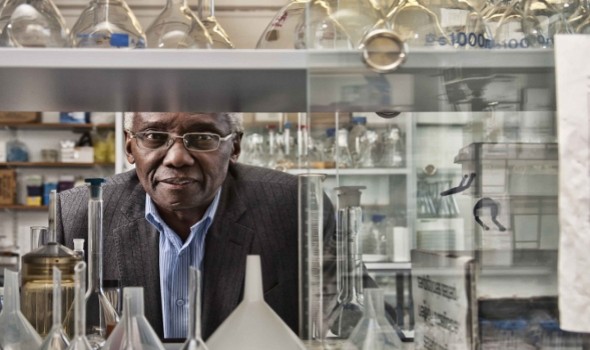Geoff Palmer – Professor of Grain Science and Historian, Penicuik
Geoff Palmer – Professor of Grain Science and Historian, Penicuik

I left Jamaica in 1955 when I was 14 years old. My mother had 8 or 9 sisters; I can never remember how many they are. They all lived in the same house, managed by my grandaunt. One day in 1948 I was told that my mother was going to London and I was to live with my aunts. In 1955, my mother sent for me. The idea of going to London on my own at 14 years worried me a little bit, but I had to go because my mother wanted me to come to live with her. So my aunts got my passport, a ticket to travel, a suit, and a small suitcase, which I still have. Before I left for the plane, my grandaunt wrapped me in newspaper because she said London was cold. That the trip by plane and ship took nearly two weeks was not considered by her...
The day after I arrived in London, my mother woke me up early and told me to get ready. Fortunately for me, as we were leaving, there was a man at the door asking my mother where she was taking me, and she said “to work”. The man told her, “You can go to work but he can’t, because he’s not 15”. I had to go to school. I was 14 years and 11 months - one month changed my life. My mother was very upset because she had found me a job in a grocery shop. It had cost her £86 to bring me to London and it took her seven years to save that money.
In 1958 Professor Chapman gave me a job as a junior technician at Queen Elizabeth’s College in London. One day he called me into his office and said “I don’t think you’re as stupid as you try to make out. I think you should go to university.” So I went to Leicester University in 1961 to do an Honours degree in Botany. The beginning of my career was a matter of chance and circumstances. What I’ve learnt in life is that no matter how able you are, it is the people you meet that determine what you achieve in the end.
What people need is a cup of kindness. Burns was speaking metaphorically in Auld Lang Syne. Whisky in Scottish culture is just like Russian vodka, or American bourbon, or French wine. When somebody asks you to take a drink with them that is an act of kindness... this drink of kindness does not have to be alcoholic. But how many migrants have been asked to join in such a drink? If somebody is not prepared to eat or drink with you, then you’re not part of the system. I think you get that relationship of kindness in a society if somebody sees you as equal.
In 1707 there were hardly any Scots in Jamaica, by 1800 there were about 300,000 slaves in Jamaica, and about 10,000 Scots, mainly men. Three quarters of the surnames in the Jamaican telephone book are Scottish, so many Jamaicans have some Scottish blood or history in them, whether they like it or not. So as I tell many Scots, your ancestors were not in Jamaica doing missionary service alone! Many Scottish people are fascinated by this history, because their historians never told them. Why should historians hide the truth? It is the truth that sets people free to be fair to all.
I retired in 2005 as Professor of Grain Science in the International Centre for Brewing and Distilling at the Heriot Watt University. I am proud that many of my students have made successful careers in the malting, brewing and distilling industries worldwide. I still do experiments at home in my kitchen! However, I now spend most of my time on the boards of various charitable organisations and give lectures to the community on Scottish/Jamaican/Caribbean history. This history is outlined in my book, The Enlightenment Abolished.


